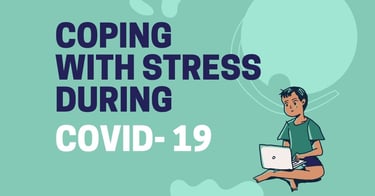 The COVID-19 pandemic has had a tremendous impact on the lives of teenagers. For children in 7th through 12th grade, going to school, interacting with friends, and engaging with family all look very different today than they did a year ago. Often, this drastic level of sudden change in a teenager’s lifestyle can give rise to feelings of uncertainty and stress. While there is no one-size-fits-all approach to managing stress, there are a number of strategies you can implement to promote positive mental health habits with your teen. Here are some tips to help manage stress in 7th-12th graders:
The COVID-19 pandemic has had a tremendous impact on the lives of teenagers. For children in 7th through 12th grade, going to school, interacting with friends, and engaging with family all look very different today than they did a year ago. Often, this drastic level of sudden change in a teenager’s lifestyle can give rise to feelings of uncertainty and stress. While there is no one-size-fits-all approach to managing stress, there are a number of strategies you can implement to promote positive mental health habits with your teen. Here are some tips to help manage stress in 7th-12th graders:
Invest in communication
Teenagers are spending more time at home due to the pandemic, and, as a result, more time with their parents. This increased interaction with your child may prompt you to question how you and your teen are communicating. Ask your teenager how they are coping with the changes they are experiencing, and inquire about the ways in which they feel that you as a parent can help them. Through words and actions, parents can build an environment where open communication is accepted and encouraged. For example, building unstructured time with your teen into your schedule creates an organic space for your child to open up and discuss what is on their mind. You can also encourage open communication with your child by taking the lead yourself. Discussing your own struggles in coping with the pandemic will invite your teen to do the same, and this degree of vulnerability establishes a level of trust and confidence that will contribute to an environment of mutual sharing and respect.
Respect their boundaries
Adolescence is a time marked by burgeoning independence. For many teens the increased time at home and with family brought on by the pandemic might make them feel like they have lost that independence, which can be a difficult lifestyle change for them. Finding ways to respect a teenager’s boundaries and independence while at home can be particularly challenging for parents. To balance family time while respecting your teen’s independence, try finding ways to spend time together without being on top of one another. This could be something as simple as sitting together while each does different activities. Additionally, parents should respect their children’s need to spend time on their own. Teenagers in particular may be spending greater amounts of time on their phones or on social media in order to connect with their friends. While screen time should be monitored, it is also important that teens have time to themselves to talk with friends and keep their social circles intact during this time.
Focus on what you and your teen can control together
So much of the disruption caused by the COVID-19 pandemic is created by factors outside of a parent’s control: school closures, sporting cancellations, and postponed trips all fit this mold. Although there is no perfect solution to responding to this constant uncertainty, there are ways to make things more manageable for yourself and your family.
Often, stress is generated through worry about future events. It is important to plan for the future, but when our minds become overly preoccupied with future events our thoughts are neither productive nor healthy. For teenagers especially, the drastic change in their lifestyle caused by the pandemic can lead to anxiety about what their future will look like. Defusing the stress brought on by uncertainty is an important part of maintaining mental health. This entails finding ways to cope with the feelings brought on by a problem rather than troubleshooting the problem itself. If you find your teen stressed about an upcoming exam, for example, explore ways to help them deal with the feelings of stress they are experiencing in the present moment instead of brainstorming additional study techniques. Seemingly simple things such as taking your child for a walk or even just sitting and breathing intentionally with them for a moment can remind them to focus on the present and greatly reduce stress.
Channel your own inner teen
One advantage parents have in relating to their teens is that they were teens themselves. Remember your own adolescence—it was a time comprised of numerous milestones that mark a teenager’s life: sporting competitions, school dances, proms, and graduation ceremonies just to name a few. Teenagers coming of age in the COVID era have lost all of these valuable hallmarks of adolescence, and may naturally respond to this loss by exhibiting signs of grief. Referring to your own high school experience may allow you to empathize with your teen and better understand the source of their frustrations. Since teens feel emotions more strongly than adults, it is important to put yourself in their shoes to address their feelings with compassion and care rather than seeing them as problems to combat. Additionally, a parent’s experience beyond their teenage years may provide some perspective to a teen frustrated with the uncertainty of their future.
If you are concerned about your child’s mental or emotional health, contact a mental health professional, your family pediatrician, or school counselor to explore courses of action. At Sanford School, we have three school counselors that provide support, along with COVID-19 Information, Updates & Resources to help support your child’s mental health during the pandemic.
See Also: Helping Your Younger Child Manage Stress During the COVID-19 Pandemic, 8 Tips for Student Success During Distance Learning
Courtney Gregor is the Middle School counselor & learning services coordinator. She received her bachelor's degree in Psychology from Franklin and Marshall College and a master's degree in School and Mental Health Counseling from the University of Pennsylvania. She also has a National Counselors Certification. In addition to serving students as a counselor, Courtney is the head swim coach at Sanford.
Skye Rashkind is the Lower School counselor & learning services coordinator. Skye has been an educator for 25 years in a variety of roles and school communities. She has taught at the elementary school level, has been a museum educator, an admissions counselor, and a tutor. Skye holds a B.A. in Psychology from Dickinson College, an M.A.T. in Elementary Education from Brown University, and an M.Ed. in School Counseling from Wilmington University.
Sarah Satinsky is the Upper School counselor & learning services coordinator. Sarah is a Licensed Professional Counselor of Mental Health (LPCMH) in Delaware and was in private practice in Texas before moving into the school counseling world. She earned her bachelor's degree from The University of Texas at Austin and received her master's degree from Southern Methodist University.









